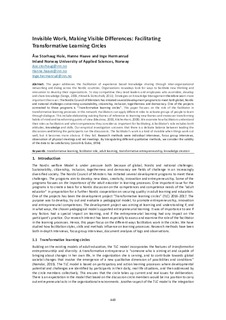| dc.contributor.author | Hole, Åse Storhaug | |
| dc.contributor.author | Haave, Hanne Marit | |
| dc.contributor.author | Hermanrud, Inge | |
| dc.date.accessioned | 2018-02-14T12:51:01Z | |
| dc.date.available | 2018-02-14T12:51:01Z | |
| dc.date.created | 2017-09-21T09:50:46Z | |
| dc.date.issued | 2017 | |
| dc.identifier.citation | Proceedings of the 18th European conference on knowledge management. 2017, 449-445. | nb_NO |
| dc.identifier.issn | 2048-8971 | |
| dc.identifier.uri | http://hdl.handle.net/11250/2484684 | |
| dc.description.abstract | The paper addresses the facilitation of experience based knowledge sharing through inter-organizational networking and dialog across the Nordic countries. Organizations nowadays look for ways to facilitate new thinking and innovation to develop their organizations. To stay competitive they need leaders and employees who assimilate, develop and share knowledge (Senge, 2006, Filstad & Gottschalk, 2011). Strategies on Knowledge Management therefore seem more important than ever. The Nordic Council of Ministers has initiated several development programs to meet both global, Nordic and national challenges concerning sustainability, citizenship, inclusion, togetherness and democracy. One of the Projects connected to these programs is “Transformative learning circles”. This paper focuses on the role of the facilitator in transformative learning processes in this network. Facilitators can apply different roles to activate groups of people to learn through dialogue. This include elaborating existing frames of reference to learning new frames and moreover transforming habits of mind and transforming points of view (Mezirow, 2000, Kitchenham, 2008). We examine how facilitators understand their roles as facilitators and what competences they consider as important for facilitating. A facilitator’s role includes both attitudes, knowledge and skills. Our empirical investigation uncovers that there is a delicate balance between leading the discussions and letting the participants run the discussions. The facilitator’s work is a kind of invisible when things work out well, but it becomes more obvious if they fail. Research methods were individual interviews, focus group interviews, observation of physical meetings and net meetings. By triangulating different qualitative methods, we consider the validity of the data to be satisfactory (Lincoln & Guba, 1994). | nb_NO |
| dc.language.iso | eng | nb_NO |
| dc.rights | Attribution-NonCommercial-NoDerivatives 4.0 Internasjonal | * |
| dc.rights.uri | http://creativecommons.org/licenses/by-nc-nd/4.0/deed.no | * |
| dc.subject | transformative learning | nb_NO |
| dc.subject | facilitator role | nb_NO |
| dc.subject | adult learning | nb_NO |
| dc.subject | transformative entrepreneurship | nb_NO |
| dc.subject | knowledge creation | nb_NO |
| dc.title | Invisible work, making visible differences. Facilitating transformative learning circles. | nb_NO |
| dc.type | Journal article | nb_NO |
| dc.type | Peer reviewed | nb_NO |
| dc.description.version | publishedVersion | nb_NO |
| dc.source.pagenumber | 449-445 | nb_NO |
| dc.source.journal | Proceedings of the 18th European conference on knowledge management | nb_NO |
| dc.identifier.cristin | 1496186 | |
| cristin.unitcode | 209,98,60,1 | |
| cristin.unitname | Institutt for organisasjons- og ledelsesfag | |
| cristin.ispublished | true | |
| cristin.fulltext | original | |
| cristin.qualitycode | 1 | |

